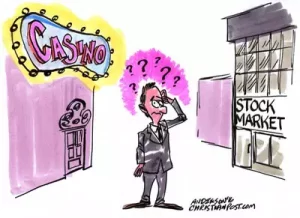
Is it a sin to buy a lottery ticket? What about making a bet at a casino – so long as it’s a budgeted amount of money and made responsibly? How about dropping a sports bet? Is it a sin to gamble?
Some people would argue there is nothing sinful about it. Recently, after posting on Facebook one of my editorials against the legalization of sports betting in the Tar Heel state, a woman said in the comments section: “I’ve never found any basis in the Bible to oppose gambling specifically, even though I have searched.” Another woman wrote, “Nowhere in the Bible does it say gambling is a sin — not one single sentence about gambling.”
Guess what? Those two women were right. One cannot show any place in Scripture where it directly says, “Thou shalt not gamble.” But is the matter that easily dismissed?
The late Dr. D. James Kennedy, a renowned Presbyterian minister, used to counter this argument in favor of gambling by explaining it’s also impossible to find in Scripture where it directly says, “Thou shalt not watch pornography.” Nevertheless, the Bible does talk about the sin of lust and advocates principles that would prohibit doing anything that would entertain, generate, or provide for the means and expression of lust.
The Bible also talks about the sin of covetousness. “Those who cannot see the connection between pornography and lust are not likely to see the connection between covetousness and gambling,” said Kennedy. “The truth is, however, that gambling is a form of the sin of covetousness.”
What is covetousness, one might ask? In short, covetousness is an inordinate desire for wealth and possessions or someone else’s possessions.
Rex Rogers, in his book Seducing America, rightly says there are only three ways to legitimately acquire property: 1. as a gift, 2. as a payment for labor, and 3. in fair exchange. Anything else is covetousness and gambling certainly doesn’t fit any of these criteria.
Covetousness is a violation of the 10th Commandment of God, “Thou shalt not covet …” (Exodus 20:17). Gambling flows from a spirit of avarice and greed. This is what makes it so exciting and addictive. It stirs up what is depraved in human nature and can make a person lose their way. Gambling is born of the burning desire for quick earthly riches.
Thus, the Scriptures provide strong warnings about covetousness. Jesus said, “Take heed and beware of covetousness: for a man’s life consists not in the abundance of the things which he possesses” (Luke 12:15). The apostle Paul admonished, “But those who want to be rich fall into temptation, a trap, and many foolish and harmful desires, which plunge people into ruin and destruction. For the love of money is the root of all kinds of evil, and by craving it, some have wandered away from the faith and pierced themselves with many pains” (I Timothy 6:9-10).

Many other principles in the Bible indict and condemn the practice of gambling:
- Love of one’s neighbor. Jesus commanded, “Love your neighbor as yourself” (Mark 12:31). Gambling is predicated on the losses, pain, and suffering of one’s neighbor.
- Exploiting the poor and vulnerable. Gambling preys on the desperation of the poor. Based in Washington, D.C., Stop Predatory Gambling notes that “[s]tate governments concentrate lottery outlets in economically-distressed regions to entice more citizens from the lower rungs of the income ladder. Lotteries are pushing scratch tickets as high as $50 in low-income communities to citizens who earn a minimum wage of $7.25 an hour in those same states. It takes seven hours of work to lose it all on a $50 ticket.” The prophet Isaiah said, “The Lord brings this charge against the elders and leaders of his people. Why do you crush my people and grind the faces of the poor?” says the Lord God of hosts” (Isaiah 3:14).
- A strong work ethic. God has designed work as the proper means for humankind to supply their needs and provide for their loved ones. Gambling undermines the work ethic and touts the false hope of something for nothing. Genesis 3:19 makes it clear that from the beginning of time God ordered that mankind earn his bread by the “sweat of his brow” — meaning hard work. This principle is so important in the New Testament dispensation that II Thessalonians 3:10 reads, “If anyone isn’t willing to work, he should not eat.” Syndicated columnist George Will summarized it this way: “The more people believe in the importance of luck, chance, randomness, and fate, the less they believe in the importance of stern virtues such as industriousness, thrift, deferral of gratification, diligence, and studiousness.”
There are numerous other ways gambling runs afoul of the Bible’s teachings. God requires good stewardship of one’s possessions. Jesus alluded to this in the parable of the talents (Matthew 25:14-30). Generally speaking, gambling is a waste of one’s resources that could have been put to good use. The games are rife with deception, concealing or misleading people about the odds. The Psalmist said the Lord would destroy those who tell lies, and he abhors those who deal treacherously (Psalm 5:10).

Moreover, state-sanctioned gambling undermines the God-ordained purpose of government to suppress and judge evil (Romans 13:1-5). The state does just the opposite by allowing the citizenry to be fleeced and victimized by gambling.
Its most unfortunate churches often promote gambling by using games of chance for charitable purposes. They say the end justifies the means. Gamblers sometimes rationalize making their bets by noting that churches have bingo games, raffles, etc. Churches, however, and Christians in general, should be setting the right example by not participating in any kinds of gambling. Of all those who should demonstrate that we should keep free from the love of money and be content with what God has provided (Hebrew 13:5), it’s the people of God.
Indeed, the Bible may not say, “Thou shalt not gamble.” Still, God’s Word is filled with precepts and principles that unquestionably condemn the practice as sinful. It doesn’t matter whether the money wagered was deemed a responsible bet or not. When one gambles, it is a covetous act that is participatory and complicit in a baneful enterprise that shares in the guilt of many other sins.





